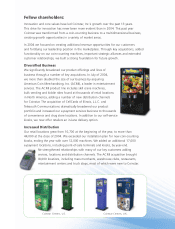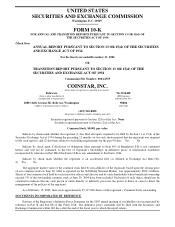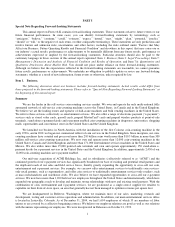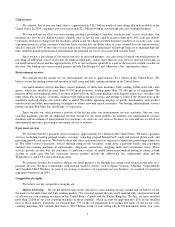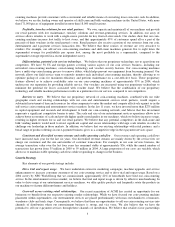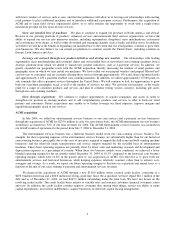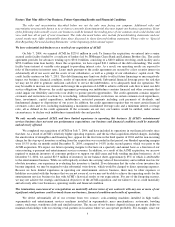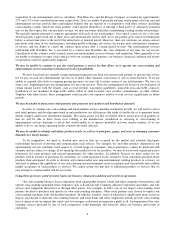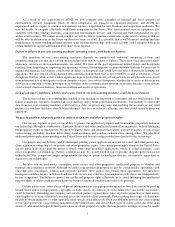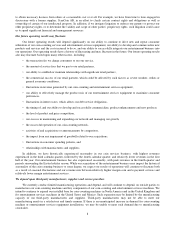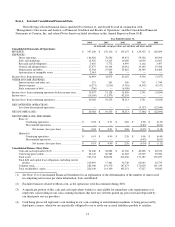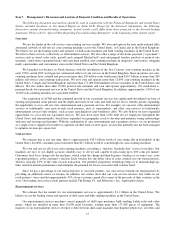Redbox 2004 Annual Report Download - page 10
Download and view the complete annual report
Please find page 10 of the 2004 Redbox annual report below. You can navigate through the pages in the report by either clicking on the pages listed below, or by using the keyword search tool below to find specific information within the annual report.6
acquisition of our entertainment services subsidiary, Wal-Mart, Inc. and the Kroger Company accounted for approximately
27% and 11% of our consolidated revenue, respectively. If we are unable to persuade existing retail partners that our coin and
entertainment services provide direct and indirect benefits that are superior to or competitive with other systems (including
coin-counting systems which the retail partners could operate themselves or through a third party) or alternative potential
uses of the floor space that our machines occupy, we may encounter difficulties maintaining existing retailer relationships.
We typically operate pursuant to separate agreements with each of our retail partners. Our typical contract is for a set term,
which typically ranges from one to three years and automatically renews until we or our partner gives notice of termination
before a certain time prior to the end of the initial term or renewal period. However, there are variations on certain contract
provisions with some of our retail partners, including product offerings, the service fee we pay each retail partner, frequency
of service, and the ability to cancel the contract upon notice after a certain period of time. Our entertainment services
relationship with Wal-Mart, Inc. is governed by a contract that Wal-Mart, Inc. may terminate at any time, for any reason.
Cancellation of this contract could seriously harm our entertainment services business and reputation. More generally, if we
are unable to maintain or renew such contracts with our existing retail partners, our business, financial condition and results
of operations could be significantly impaired.
We may be unable to continue to pay our retail partners a service fee that allows us to operate our coin-counting and
entertainment services machines at historical levels of profitability.
We have faced and are currently facing ongoing pricing pressure from our current retail partners to increase the service
fee we pay on coin and entertainment services or to make other financial concessions to win or retain business. If we are
unable to respond effectively to ongoing pricing pressures, we may fail to retain certain of our retail partners. We have, in
some cases, implemented new fee arrangements for our coin services. These fee arrangements are based on our evaluation of
certain unique factors with the retailer, such as total revenue, e-payment capabilities, long-term non-cancelable contracts,
installation of our machines in high traffic and/or urban or rural locations, new product commitments, or other criteria.
Together with other factors, these arrangements could increase our expenses relative to coin services significantly in future
periods.
We may be unable to attract new retail partners and penetrate new markets and distribution channels.
In order to continue our coin-counting and entertainment services machine installation growth, we will need to attract
new retail partners and develop operational or unit production cost efficiencies that make it feasible for us to penetrate lower
density markets and/or new distribution channels. We cannot assure you that we will be able to attract new retail partners or
that we will be able to drive down costs relating to the manufacture, installation or servicing of coin-counting or
entertainment services machines to levels that would enable us to operate profitably in lower density markets. If we are
unable to do so, our future operating results could be adversely affected.
We may be unable to identify and define product trends, as well as to anticipate, gauge, and react to changing consumer
demands in a timely manner.
To be competitive, we need to develop new services that are accepted by the market and establish third-party
relationships necessary to develop and commercialize such services. For example, toy and other products dispensed in our
entertainment services machines must appeal to a broad range of consumers whose preferences cannot be predicted with
certainty and are subject to change. If we misjudge the market for our toy products, we may be faced with significant excess
inventories for some products and missed opportunities for other products. In addition, because we place orders for toy
products well in advance of purchases by consumers, we could experience excess inventory if our consumers purchase fewer
products than anticipated. In order to develop and commercialize new non-entertainment vending products or services, we
will need to enhance the capabilities of our coin-counting and entertainment services machines and our network and establish
market acceptance of such products or services. We cannot assure you that new or additional products or services that we
may attempt to commercialize will be successful.
Competitive pressures could seriously harm our business, financial condition and results of operations.
Our coin-counting business faces competition from supermarket retailers, banks and other companies that purchase and
operate coin-counting equipment from companies such as ScanCoin AB, Cummins-Allison Corporation and others, and who
service such equipment themselves or through third parties. For example, in 2003, one of our largest coin-counting retail
partners decided to purchase and operate its own coin-counting machines. Other retail partners may choose to replace our
coin-counting machines with self-installed machines. In addition, retailers, some of which have significantly more resources
than us, may decide to enter the coin-counting business and some banks and other competitors already provide coin-counting
free of charge or for an amount that yields very low margins or that may not generate a profit at all. An expansion of the coin-
counting services provided by any of such competitors could materially and adversely affect our business and results of
operations.


